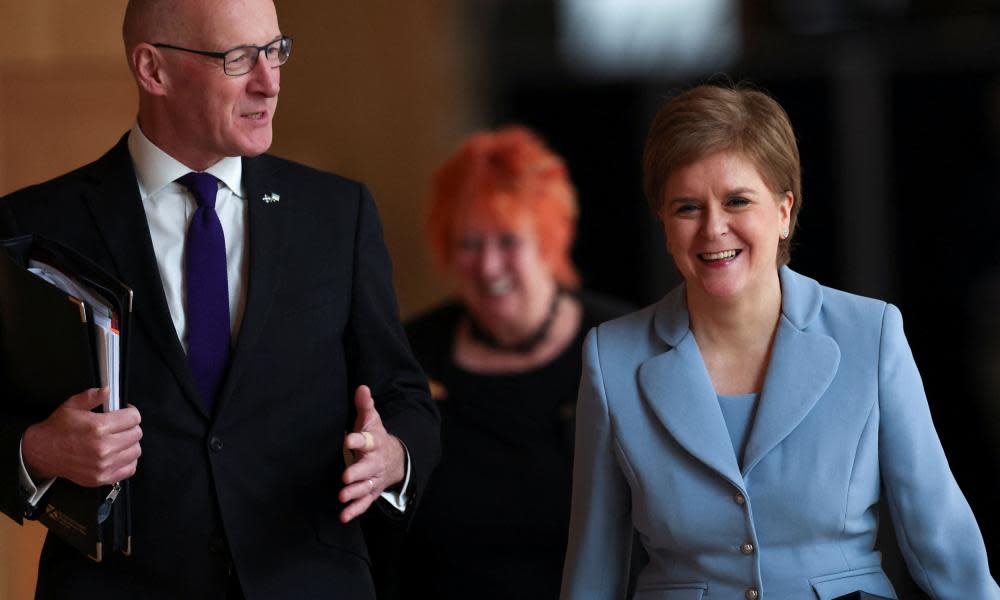Sturgeon faces tough hurdles on road to Scottish independence vote

There have always been three routes to a second referendum on Scottish independence and, despite the buildup and rhetoric around Tuesday’s statement, they remain unchanged – a section 30 order from the UK government; risking a domestic boycott and international opprobrium with a wildcat vote; or putting a referendum bill to the Holyrood parliament and facing down an almost inevitable court challenge.
Nicola Sturgeon told MSPs on Tuesday afternoon that she had written to Boris Johnson again, the latest of repeated requests for a section 30 order under the 1998 Scotland Act that would grant Holyrood the competence to legislate for another referendum. The previous one happened in 2014 and it is a process described as the “gold standard” by the first minister.
Johnson responded that he would “study it very carefully and we will respond properly” but the reply is unlikely to differ from previous iterations: no.
Sturgeon has repeatedly ruled out a Catalan-style wildcat vote, which leaves the route set out by Sturgeon in Holyrood but which constitutional experts suggest takes us little further forward on the key question of whether the Scottish parliament can legislate for a second referendum when the constitution is reserved to Westminster.
The Scottish government on Tuesday introduced a referendum bill and – in a pre-emptive move that seizes the political agenda and leapfrogs the danger of Holyrood’s presiding officer ruling the bill out with competence – has asked the lord advocate, Scotland’s most senior law officer, to raise the matter with the supreme court.
Sturgeon told MSPs: “There has been much commentary in recent days to the effect that a consultative referendum would not have the same status as the vote in 2014. That is simply wrong, factually and legally. The status of the referendum proposed in this bill is exactly the same as the referendums of 1997 [devolution], 2014 [independence] and 2016 [Brexit].”
Sturgeon’s emphasis on the consultative nature of the vote is curious. As Kenneth Armstrong, a professor of European law at the University of Cambridge, pointed out: “Every referendum in our constitutional setup is consultative rather than self-executing, unless the legislation mandates what has to happen if a vote goes a particular way. Given the experience of the Brexit referendum, there is an argument for having a propositional referendum (is independence a good idea?) followed by a dispositive referendum (this is what independence looks like, is it what you want?) but that’s a different sort of question of constitutional design.”
According to James Mitchell, a professor of public policy at the University of Edinburgh, Sturgeon “ignores the crucial point that while legally her bill might – depending on supreme court judgment – be the same, it is politically totally different. And, as she must know, the UK has a ‘political constitution’.”
The most notable aspect of the statement was that Sturgeon had set the ball rolling on another campaign, said Mitchell, “but beyond that there is nothing new”.
In terms of how the supreme court may rule on the lord advocate’s reference, Armstrong said it must first decide if it is willing to accept it without seeing the final version of the bill, which has only just been published.
“There is a risk that it takes the view that the Scottish parliament needs to first pass the bill so that the issue is not simply hypothetical or advisory.”
Sturgeon said that if the supreme court did not rule in the Scottish government’s favour, the Scottish National party would fight the next UK general election on the question of whether Scotland should be independent.
While this may well put Scottish Labour in a difficult position in a forthcoming election campaign, the outcome would have no legal force whatsoever – “just campaign rhetoric”, as Chalmers puts it. Success would add power to SNP claims of a political mandate but it would also entirely contradict Sturgeon’s own assertion that any future vote must be legally valid and internationally recognised.

 Yahoo Movies
Yahoo Movies 
